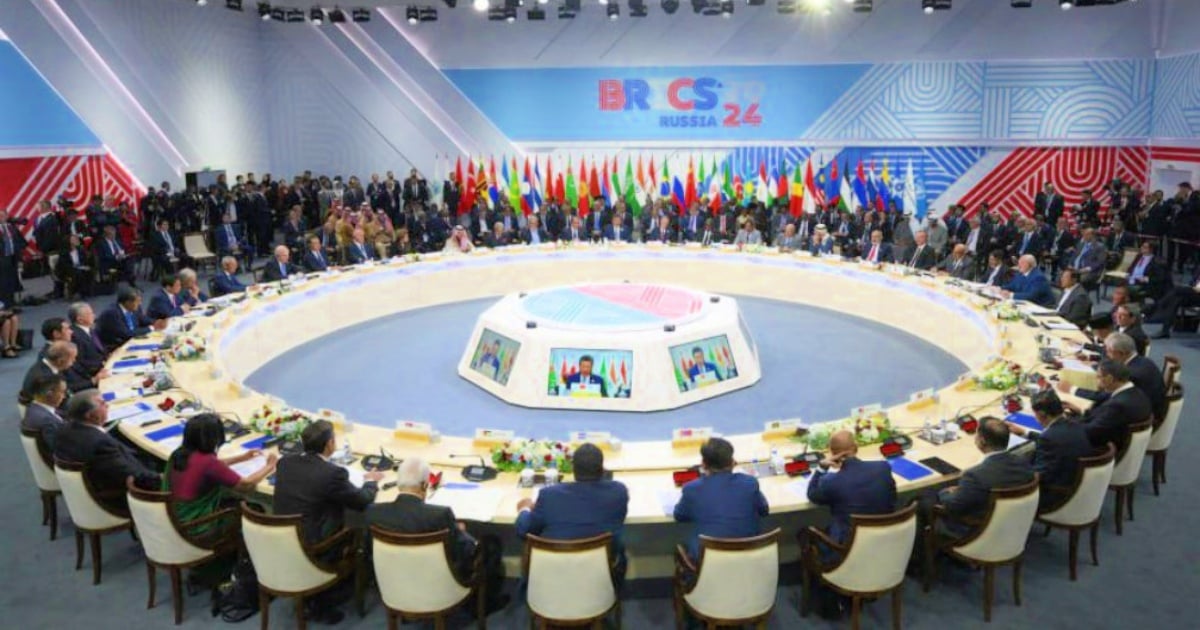
During the XVI BRICS Summit, which concluded this Thursday in the city of Kazan, Russia, the acceptance of Cuba along with 12 other countries as "associate members" of the group was announced.
This decision, which reflects the strategic expansion of the BRICS, grants these countries the status of "partners," a position that could open the door to full membership in the future.
In addition to Cuba, the new associate members include Algeria, Belarus, Bolivia, Indonesia, Kazakhstan, Malaysia, Nigeria, Thailand, Turkey, Uganda, Uzbekistan, and Vietnam, all nations with economies superior to Cuba.
Although the partner status does not grant full rights, it is considered a step towards full membership in future expansions.
"#Cuba is honored to enter as a partner country in the #BRICS, five letters and a great hope for the countries of the South, on the arduous path towards a more just, democratic, equitable, and sustainable international order," wrote Díaz-Canel on X this Friday.
"#Cuba, by being accepted as a partner country of #BRICS, reaffirms its interest and commitment to join and work alongside its members in defense of multilateralism, peace, international law, and the construction of a development and cooperation agenda that responds to the priorities of the Global South," wrote Foreign Minister Bruno Rodríguez.
"We come to Kazan to reaffirm our interest in joining forces with the #BRICS to share our valuable experiences and results in various areas, for the benefit of our peoples and countries," he had previously written.
That statement from the Chancellor led to numerous comments from outraged Cubans who questioned what results and what "valuable experiences" the island could contribute to that group given its current situation.
In another tweet, Bruno Rodríguez indicated that "Cuba sees with immense satisfaction how the #BRICS have among their priorities the confrontation of the current global food and energy crisis, with very positive experiences, the results of which have been validated in many of their member countries."
During the meeting, held in Russia, Cuban Foreign Minister Bruno Rodríguez Parrilla justified Miguel Díaz-Canel's absence from the summit due to the recent energy crisis in Cuba and the impact of Hurricane Oscar.
Rodríguez Parrilla emphasized that this situation is due to the economic sanctions of the United States, which, he stated, limit the island's access to essential fuels and spare parts.
In thanking for the invitation to the summit, the chancellor emphasized the strategic role of the BRICS group and highlighted the potential of the New Development Bank of the bloc as a favorable financial alternative for countries in the Global South.
According to Rodríguez Parrilla, the bank and the mechanism of reserves in local currencies promoted by the BRICS offer "a more inclusive international financial architecture."
Venezuela and Nicaragua are excluded from BRICS.
Russian President Vladimir Putin emphasized that the inclusion of new partners was done organically and responsibly.
Regarding Venezuela and Nicaragua, it was reported that they were excluded from this expansion phase due to Brazil's opposition, which justified this decision as a result of a "loss of trust" in the Venezuelan government.
Celso Amorim, advisor to Brazilian President Luiz Inácio Lula da Silva, stated that it is not a matter of political regime, but of reliability in relations, according to reports from Brazilian media.
An economic and political counterweight to the power of the West
The summit concluded with a unanimous condemnation of unilateral sanctions that lack UN support, pointing out their negative impact on the most vulnerable populations.
The BRICS, which represent 45% of the global population and 35% of the global economy, proposed the creation of an independent payment infrastructure, called "BRICS Clear," which aims to complement the current financial system and reduce dependence on the US dollar.
The final statement included strategic topics such as geopolitics, the fight against drug trafficking, and advancements in artificial intelligence.
More than 20 global leaders attended the summit, including Chinese President Xi Jinping, Indian Prime Minister Narendra Modi, and Iranian President Masud Pezeshkian.
For Cuba, participation in this forum strengthens its integration into initiatives such as the Belt and Road promoted by China, as well as the Eurasian Economic Union, which reinforces its position as a partner of the BRICS and opens doors to future alliances in strategic sectors such as biotechnology and health.
What do you think?
COMMENTFiled under: